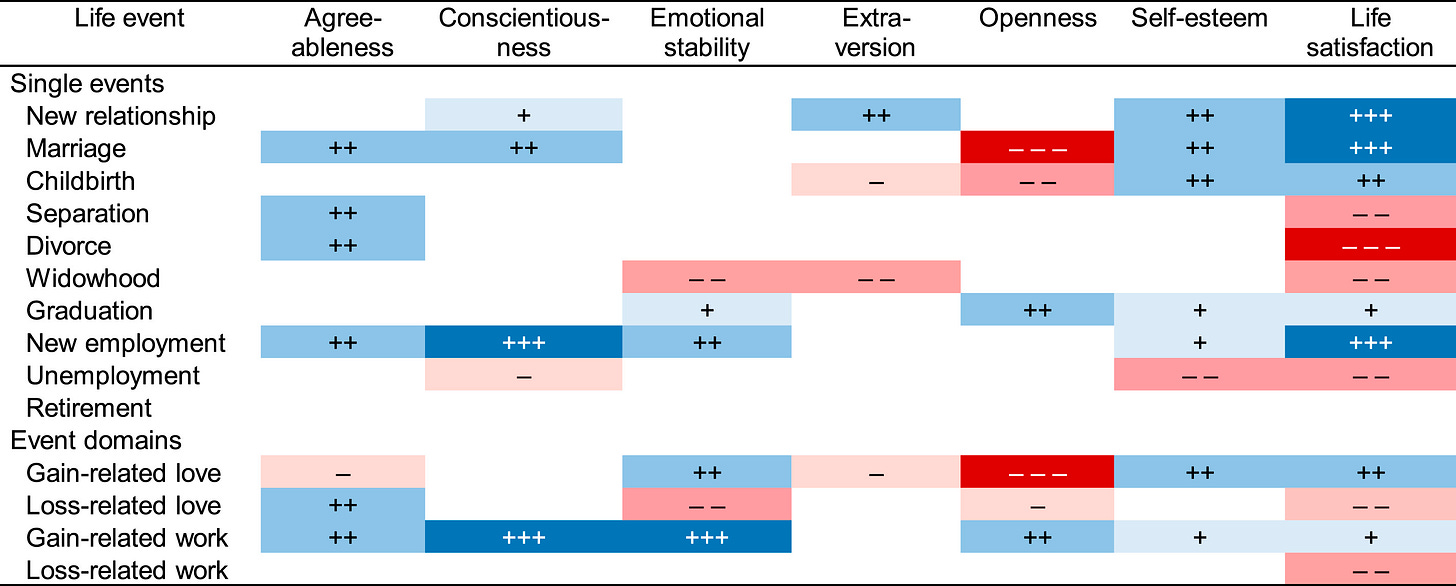Can Life Events Change Your Personality?
Yes, but there's a catch

In Case You Missed It…
Personality researchers have devoted thousands of hours and countless journal pages to exploring how personality shapes people’s life outcomes. It’s been time and paper well spent, as they’ve come away with many solid conclusions. They’ve discovered, for instance, that conscientious people tend to do better in school and at work, while highly neurotic people are more prone to relationship troubles and health problems. That kind of thing.
But does the causal arrow ever point in the other direction? That is, can life events also shape people’s personalities?
A new study by Peter Haehner and colleagues addresses this long-standing question, and concludes that the answer is yes. But don’t expect a dramatic transformation. The changes are real but modest.
Drawing on data from nearly 200,000 participants across seven large panel studies, the team looked at how major life events, such as starting a new job, getting married, or getting divorced, can shift people’s Big Five personality traits.
The figure below summarizes the main findings. Blue indicates that the life event leads to higher scores on a trait; red indicates the reverse. The darker the color, the stronger the effect.
Some highlights:
Starting a new job makes people more conscientious and less neurotic. This makes sense: Work demands effort and orderliness, while often reducing anxiety and other negative emotions by boosting income and self-esteem.
Getting married makes people less open. This may be because people often reduce exploratory behavior after tying the knot, and adopt more traditional roles.
Separating or getting divorced makes people more agreeable. This could be the result of leaving a situation that previously made them disagreeable - a difficult marriage - or it might reflect a conscious effort to be more pleasant as they seek a new partner. Alternatively, maybe people get humbled.
To put these changes in perspective, the researchers compared the effects of life events on personality with their effects on self-esteem and life satisfaction (also shown in the figure). Personality changes were about as big as self-esteem changes, but smaller than changes in life satisfaction. Like most effects in psychology, shifts in personality were fairly modest.
The upshot is that personality is hard to budge, but it’s not set in stone. Life leaves its mark - but usually just a small one.
You can read the Haehner paper here for free.
Follow me on Twitter/X for more of the same only different.
Coming Soon to The Nature-Nurture-Nietzsche Newsletter…
Beyond Body Count: How Many Past Partners Are Too Many?
12 Things Everyone Should Know About the Big Five Personality Traits
Why Implicit Bias Training is a Waste of Time
How You Can Support the Newsletter
I love writing The Nature-Nurture-Nietzsche Newsletter! My goal is to make it a space for free thought and nonpoliticized psychology, and ultimately a viable alternative career. If you’d like to support my efforts, there are several ways you can do it.
Like and Restack: Click the buttons at the top or bottom of the page to boost the post’s visibility on Substack.
Share: Send the post to friends or share it on social media. It’s free to read for all, so they won’t hit a paywall.
Upgrade to a Paid Subscription: A paid subscription will get you:
If you could do any of the above, I’d be hugely grateful. Thank you!
Steve Stewart-Williams



My razor towards changes in personality, intelligence (modestly), weight, etc has been “conditionally possible, but rare, not random, domain specific, and attenuates without ongoing intervention.” Think of your teeth. If you are born with crooked teeth, they will remain that way until a strong enough intervention (braces) is in place, but once the intervention is gone without a way to maintain the results (retainers) your teeth will just revert back to their crooked baseline.
Personality changes, IQ increases in low IQ children that then attenuated (e.g. preschool studies), weight loss and subsequent wait gain, muscle gain followed by muscle loss, braces for crooked teeth, etc, all follow this pattern in my view.